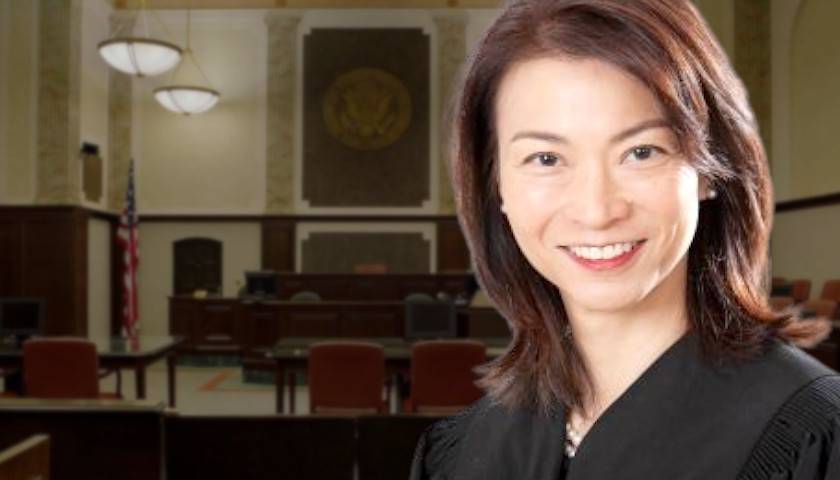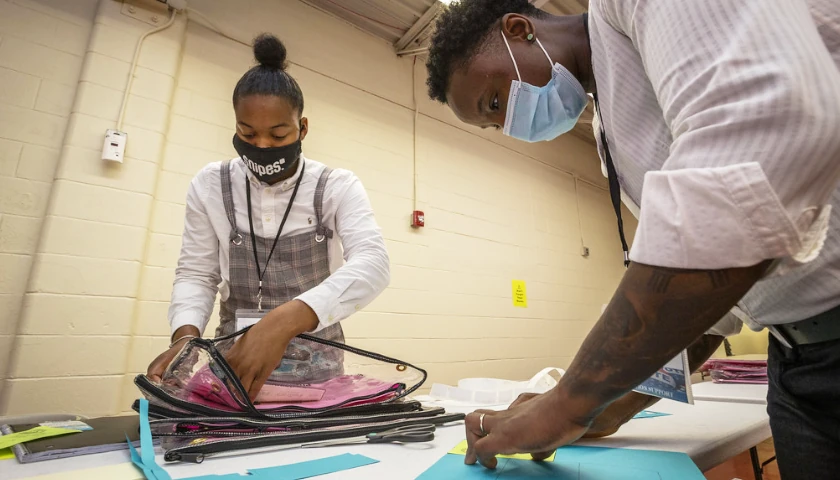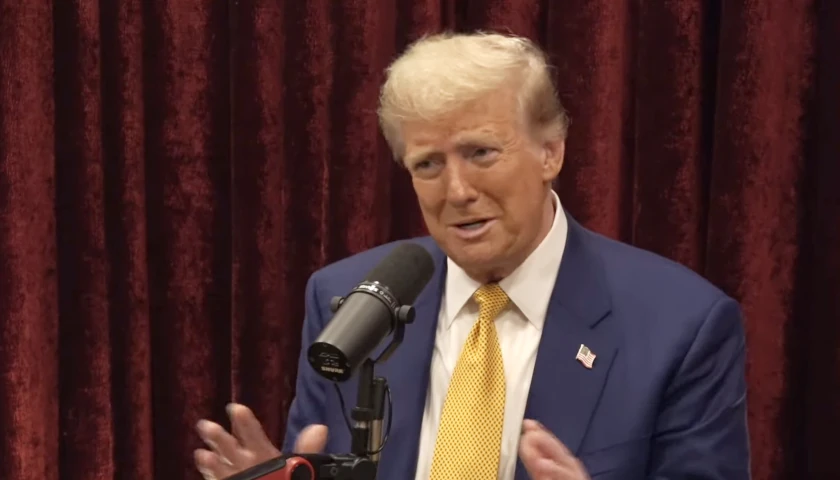If a court proceeding held in the nation’s capital on Tuesday is an indication of how 2024 will go—things will be a lot worse than even the biggest skeptic predicted.
A three-judge panel of the Court of Appeals for the District of Columbia—Biden appointees Florence Pan and Michelle Childs and George H. W. Bush appointee Karen Henderson—heard oral arguments for Donald Trump’s appeal of a lower court decision that concluded presidents are not immune from criminal prosecution for their conduct in office. The appeal originated out of Special Counsel Jack Smith’s four-count indictment against the former president related to the events of January 6.
Given the unprecedented nature of the matter before the court, one would assume the two Biden-appointed judges would take extra care in conducting the hearing as impartially and untheatrically as possible. Further, Judge Tanya S. Chutkan, an Obama appointee, last month authored the landmark decision that denied Trump’s motion to dismiss Smith’s case on immunity grounds.
Convincing the American people that judges appointed by Democrats—including those appointed by the incumbent president using his Department of Justice to pursue not one but two criminal cases against his predecessor and presumptive 2024 rival—would demand restraint and, dare we say, maturity.
That, however, did not happen.
The debate involved two competing, and untested, views: Team Trump argues impeachment and conviction by Congress is the Constitutionally mandated way to handle criminal conduct by a president while Smith and Chutkan argue that being president does not confer a “get-out-of-jail-free pass,” as Chutkan wrote in her opinion.
John Sauer, one of the attorneys representing the former president, was barely one minute into his opening statement before Pan (pictured above) cut him off. Sauer presented a few examples of former presidents who engaged in presumably prosecutable conduct in office—George W. Bush lying about the pretext of the Iraq War and Barack Obama authorizing drone strikes that resulted in the killing of Americans overseas—which prompted Pan to concoct her own hypotheticals.
Calling impeachment “a cumbersome process that requires the actions of a whole branch of government that has a lot of different people involved”—no duh—Pan asked Sauer if selling pardons or military secrets would prevent a president from criminal prosecution.
As Sauer tried to answer, Pan presented her made-for-cable-news clickbait:
She quickly interrupted Sauer—a former law clerk to Supreme Court Justice Antonin Scalia and solicitor general for the state of Missouri—as he pointed out that such an order would result in immediate impeachment and conviction. In the tone of a crotchety school marm—or political hack—Pan admonished, “I asked you a yes or no question.” She reiterated her preposterous proposal: “Could a president who ordered Seal Team Six assassinate a political rival who was not impeached, would he be subject to criminal prosecution?”
Sauer’s informed response to such an outlandish scenario and implausible outcome was, according to the media, irrelevant. (And never mind that Trump is not accused of such treachery; Smith’s indictment contains four vague statutes, two of which are under review by SCOTUS on a decision made by Pan.)
At that point, Pan won the affection of Democrats and the corporate media—something she clearly intended to do. George Conway, almost ex-husband of former Trump advisor Kellyanne, swooned over “the trap that Pan’s brilliant interrogation shut tight.”
But Pan wasn’t finished. She later posited that the integrity of a national election was a “public interest” and of no concern to a sitting president seeking re-election. And in a statement only a longtime fixture of Washington—which Pan is—could love, she claimed Trump’s interests did not “align” with those of the executive branch when he was president.
Judge Pan suggests election integrity is a “public interest” not an executive one and opines that Trump’s position “is not fully aligned with the institutional interests of the executive branch.”
Huh? pic.twitter.com/OMZk19Cbck
— Julie Kelly 🇺🇸 (@julie_kelly2) January 9, 2024
It’s instructive to take a moment to review Pan’s background. She has sterling Ivy League credentials, graduating from Stanford Law School in 1993. Like so many judges seated on the federal bench in Washington, Pan, 57, once worked for the U.S. Attorney for the District of Columbia—the office that represents the government in D.C. court proceedings.
Barack Obama nominated Pan to the district court in 2016, but her nomination expired before she could be confirmed. When Trump took office, he scuttled her nomination in favor of Dabny Friedrich. (Not exactly an upgrade.)
Touting Pan as the first Asian-American to sit on the district court, Biden renominated her in 2021. After a short stint, she was promoted to the circuit (appellate) court to replace Ketanji Brown Jackson in 2022.
I explained on Twitter/X how Pan has connections to Democratic Party activists/interests that should prompt questions about her judicial integrity. She also keeps popping up on “randomly” assigned panels to hear politically charged cases.
Here is a modified version of my post:
“Pan is married to Max Stier–one of Brett Kavanaugh’s chief antagonists. Stier claimed he observed Kavanaugh engage in lewd behavior while they were freshmen at Yale–he reported it to FBI and Senate during Kavanaugh debacle. He was recently featured in a film about Kavanaugh that criticized the FBI’s investigation into various claims.
A longtime DC fixture, Pan has friends in high places.
Washington Post in 2021: ‘In one of her first hearings Wednesday, Pan took over the politically sensitive lawsuit brought by 2016 Trump campaign adviser Carter Page against the FBI, Justice Department and several former officials alleging they unlawfully surveilled and investigated him during the FBI’s Russia probe. A D.C. veteran, Pan offered to recuse herself from the case, saying she has been friends with a lawyer for defendant Lisa Page, a former FBI attorney. Pan said she has known Page’s attorney, former Justice Department lawyer Amy Jeffress, for 27 years, attended her wedding, and met Page at a party.’
Jeffress is married to DC District Court Judge Chris Cooper, appointed by Obama.
Merrick Garland officiated the wedding.
Although three-judge panels are supposed to be ‘randomly’ selected, Pan oddly is seated on an unusually high percentage of consequential political cases. She was on both panels to hear arguments on an appeal related to 1512(c)(2), obstruction of an official proceeding.
Pan was the decisive 2-1 judge in both decisions upholding DOJ’s use of the post-Enron statute. Her lead opinion–and I use that term pejoratively–in Fischer v USA is now under review at SCOTUS. While Pan admitted the ‘novel’ use of 1512c2 in J6 cases–more than 300 J6ers slapped with the evidence tampering felony for their conduct on Jan 6 as is Donald Trump–she nonetheless adopted the broadest reading of 1512c2 to uphold DOJs interpretation. (I detail the case here.)
Pan upheld a nondisclosure order issued by former chief judge Beryl Howell (Obama appointee) preventing Twitter from notifying Trump about Jack Smith’s subpoena of his Twitter files and Howell’s $350,000 fine against the company. Pan: ‘The whole point of the nondisclosure order was to avoid tipping off the former President about the warrant’s existence.’
Pan also upheld Howell’s extraordinary ruling that pierced attorney-client privilege between Evan Corcoran and Trump in the classified document case, forcing Corcoran to turn over all his records to Jack Smith. A decision, by the way, that never should have been made in DC since the alleged crime happened in southern Florida.
Just last week, Pan denied the appeal of Russel Alford, convicted by a DC jury of four misdemeanors and sentenced by Judge Chutkan to 12 months in prison. Henderson, also on immunity appellate panel, wrote this but Pan concurred: ‘The trial evidence indicated that, during Alford’s brief time within the Capitol, he was neither violent nor destructive. Nevertheless, we affirm his convictions because a jury could rationally find that his unauthorized presence in the Capitol as part of an unruly mob contributed to the disruption of the Congress’s electoral certification and jeopardized public safety.’
He was inside for 11 minutes.”
Tuesday’s scripted hearing made it clear the panel—at least the Biden judges—already partially prepared an order upholding Chutkan’s decision. Timing is critical; pretrial deadlines for Trump’s March 4 trial date remain on hold pending resolution of the immunity question.
If Smith has any hope—and it is slimmer by the day—of keeping the trial date or defeating Trump’s claims of immunity, it largely depends on the views of Judge Florence Pan.
Given her record and theatrics this week, Smith undoubtedly feels buoyed.
– – –
Julie Kelly is an independent journalist covering the weaponization of the U.S. Government against her citizens, Follow Kelly on Twitter / X.





